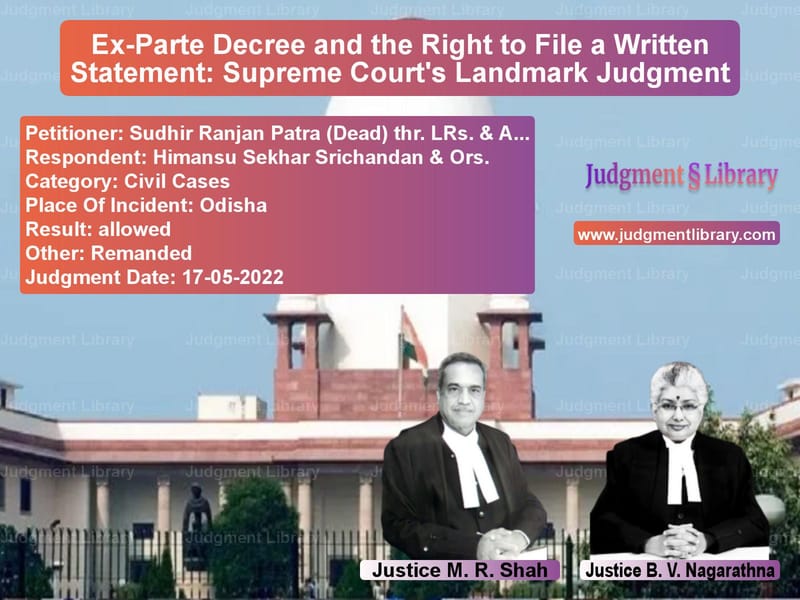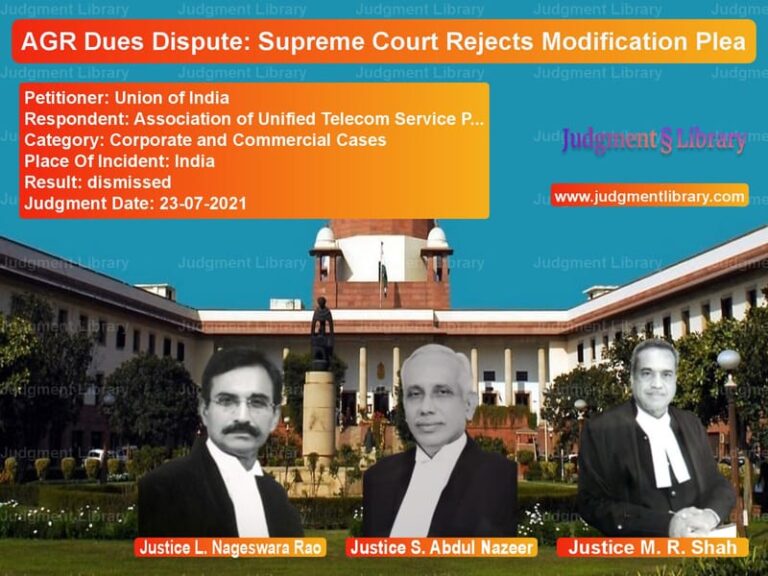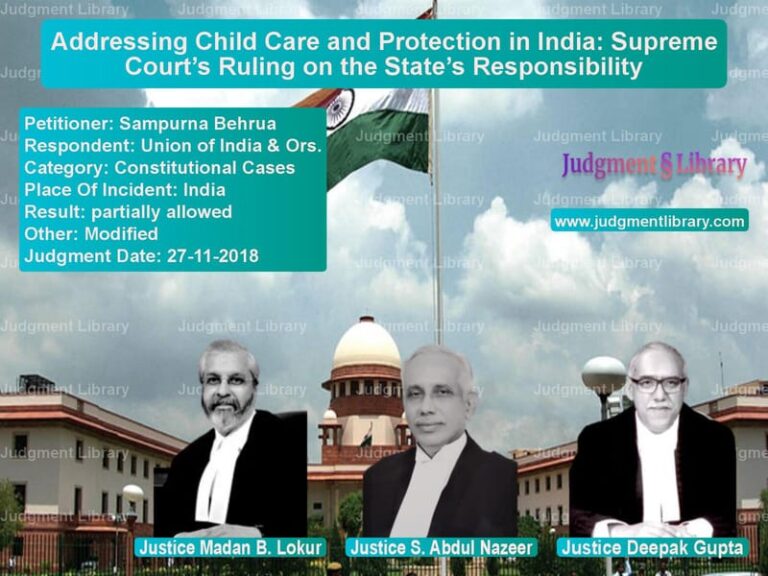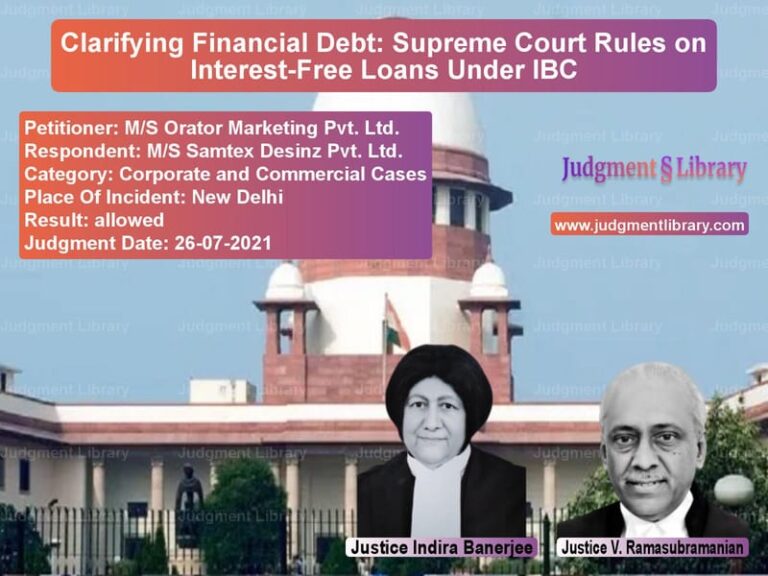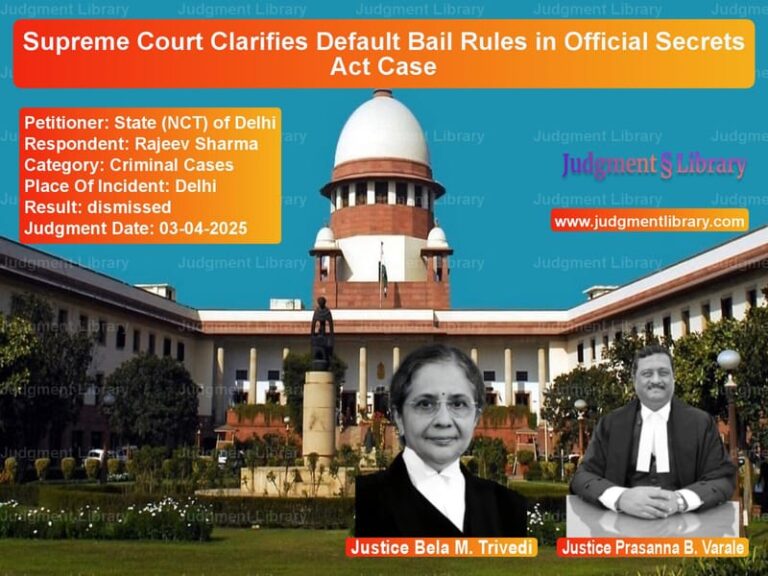Ex-Parte Decree and the Right to File a Written Statement: Supreme Court’s Landmark Judgment
The case of Sudhir Ranjan Patra (Dead) thr. LRs. & Anr. v. Himansu Sekhar Srichandan & Ors. highlights a significant issue in civil litigation: whether a defendant, after having an ex-parte decree set aside, is entitled to file a written statement. The Supreme Court of India, in its judgment dated May 17, 2022, examined the principles of procedural fairness and the right to defend in a suit.
Background of the Case
The dispute originated from a civil suit filed by Himansu Sekhar Srichandan, the plaintiff, who sought a declaration of his rights over a piece of land. The plaintiff also prayed for a decree stating that the defendants, particularly defendant no. 2, had no authority to transfer the land and that certain sale deeds executed in 2000 were not binding on him.
The defendants, including Sudhir Ranjan Patra, initially appeared in the suit proceedings but repeatedly failed to submit their written statements despite multiple adjournments. As a result, the Trial Court declared them ex-parte and passed a decree in favor of the plaintiff.
Subsequently, the defendants filed an application under Order IX Rule 13 of the Civil Procedure Code (CPC), seeking to set aside the ex-parte decree and requesting permission to file a written statement. The Trial Court accepted their request, setting aside the decree and restoring the suit. However, the High Court, while upholding the restoration, ruled that the defendants could only participate in the trial based on existing records and could not submit their written statement.
Legal Issues Before the Court
- Whether a defendant, after having an ex-parte decree set aside, is entitled to file a written statement.
- Whether the High Court was correct in restricting the defendants’ right to present their case fully.
- Whether the precedents in Sangram Singh v. Election Tribunal, Kotah and Arjun Singh v. Mohindra Kumar were applicable to the present case.
Arguments Presented by the Appellants (Defendants)
The appellants, who were the original defendants, contended the following:
- Once the ex-parte decree was set aside, they should have been restored to their original position in the suit and allowed to file their written statement.
- The High Court had overstepped its jurisdiction by restricting their right to present their defense.
- Since the Trial Court had not explicitly ruled on the filing of the written statement, the High Court’s interference was unwarranted.
- The principle of fair trial dictates that the defendants must be given an opportunity to present their case fully.
Arguments Presented by the Respondent (Plaintiff)
The plaintiff opposed the defendants’ plea, arguing:
- The defendants had multiple opportunities to file their written statement between 2012 and 2017 but failed to do so.
- Permitting them to file it now would unduly delay the proceedings and prejudice the plaintiff’s case.
- Legal precedents, including Sangram Singh and Arjun Singh, support the view that a defendant cannot be placed back in the same position as before after an ex-parte decree is set aside.
Supreme Court’s Observations
The Supreme Court carefully analyzed the facts and legal principles involved in the case. The Court acknowledged that while prior rulings suggested that a defendant set ex-parte could not be fully restored to their previous position, this case presented unique circumstances.
The Supreme Court stated:
“Once the ex-parte decree is set aside and the suit is restored, the defendants must be given a fair chance to present their case. The High Court exceeded its jurisdiction by denying them the right to file a written statement.”
It further ruled that the issue of whether the defendants could file their written statement should be left to the discretion of the Trial Court, considering the overall fairness of the proceedings.
Key Legal Principles Established
- Restoration of a suit does not necessarily mean full restoration of rights: The Court reaffirmed the principle that setting aside an ex-parte decree does not automatically entitle a defendant to all procedural rights as if the decree had never been passed. However, fairness demands that the defendant should be allowed a reasonable opportunity to defend.
- Trial Courts have discretion: The judgment clarified that it is within the Trial Court’s jurisdiction to decide whether a defendant should be permitted to file a written statement after an ex-parte decree is set aside.
- Precedents must be applied contextually: The Court distinguished the present case from Sangram Singh and Arjun Singh, holding that while those cases laid down general principles, each case must be decided based on its facts.
Implications of the Judgment
This ruling is significant for civil litigation in India as it ensures that procedural rules do not become a barrier to justice. By allowing the matter to be remanded to the Trial Court, the Supreme Court upheld the right of the defendants to a fair trial while maintaining judicial efficiency.
The judgment also serves as a guiding precedent for lower courts handling cases where ex-parte decrees are set aside. It reinforces the idea that courts must balance procedural requirements with the fundamental principles of justice.
Conclusion
The Supreme Court’s decision in this case is a landmark ruling that safeguards the rights of litigants while ensuring procedural discipline in civil suits. By directing the Trial Court to decide on the issue of filing a written statement, the Court maintained judicial consistency and fairness.
This case highlights the importance of timely participation in litigation and the consequences of procedural delays. At the same time, it assures that the legal system remains flexible enough to rectify procedural errors in the interest of justice.
Petitioner Name: Sudhir Ranjan Patra (Dead) thr. LRs. & Anr..Respondent Name: Himansu Sekhar Srichandan & Ors..Judgment By: Justice M. R. Shah, Justice B. V. Nagarathna.Place Of Incident: Odisha.Judgment Date: 17-05-2022.
Don’t miss out on the full details! Download the complete judgment in PDF format below and gain valuable insights instantly!
Download Judgment: sudhir-ranjan-patra-vs-himansu-sekhar-srich-supreme-court-of-india-judgment-dated-17-05-2022.pdf
Directly Download Judgment: Directly download this Judgment
See all petitions in Contract Disputes
See all petitions in Property Disputes
See all petitions in Landlord-Tenant Disputes
See all petitions in Specific Performance
See all petitions in Judgment by Mukeshkumar Rasikbhai Shah
See all petitions in Judgment by B.V. Nagarathna
See all petitions in allowed
See all petitions in Remanded
See all petitions in supreme court of India judgments May 2022
See all petitions in 2022 judgments
See all posts in Civil Cases Category
See all allowed petitions in Civil Cases Category
See all Dismissed petitions in Civil Cases Category
See all partially allowed petitions in Civil Cases Category

